The Oscar-worthy kids of 1987
 Saturday, November 7, 2020 at 6:00PM
Saturday, November 7, 2020 at 6:00PM 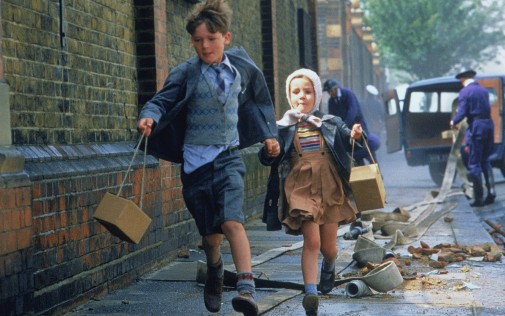 The kids of Best Picture nominee Hope and Glory
The kids of Best Picture nominee Hope and Glory
It's not often that we see child actors recognized in the film awards race. In many regards, that's understandable. Kids aren't known for being the most disciplined of performers and it seems unfair to expect them to deliver complex characterizations, or to embody concepts and ideas that they're still learning. Furthermore, while every acting job is a fruit born out of several people's labor – the actors themselves, directors, writers, editors, sound mixers, etc. – when the performer is as lacking in agency as a child, it's easier to attribute excellence to those other folks' craft. Nonetheless, good work is good work, and we should celebrate the greatness we see on-screen, regardless of how it came to be.
That brings us to 1987, the year of the next Smackdown, and a rare vintage that's stock full of brilliant performances by young artists. Curiously enough, the three Leading Actor performances paid special homage in this write-up all come from films about boys facing the harsh realities of World War II. First up, we have:
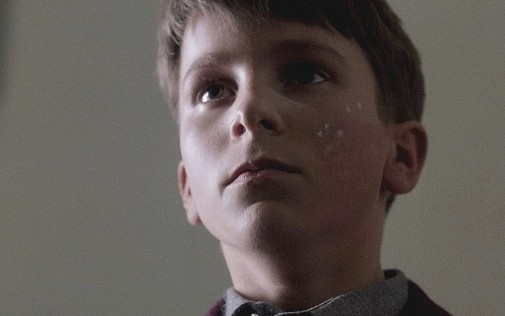
Christian Bale, EMPIRE OF THE SUN
Despite its epic proportions and Spielberg's typical appeal to sentiment and nostalgia, Empire of the Sun is, in its essence, a character study. Everything, from the staging of scenes to the use of choral music is meant to establish everything we see as an extension of the protagonist, an English son of privilege living in Shanghai when Japanese forces invade. Countless times, we are meant to see that Bale's Jim is unaware of the reality he lives in, sheltered to a spoiled degree, clouded by the veil of a happy childhood.
Because of that, the arc he goes through is all the more noticeable and felt deep within. Bale takes Jim from bratty exuberance, a Lord Fauntleroy who looks at warfare through rose-tinted glasses, to a husk of a person. It isn't merely a question of dying naivete and the pains of growing up, but the portrayal of someone whose spirit grows callous-like hardness through the friction of prolonged hardship. Even if this was a role given to an adult, Jim is one hell of a difficult character.
Bale, already an accomplished actor at the tender age of 13, tackles these challenges with the feverous abandon of an inspired master. He surrenders to Jim's early hysteria, his hunger, and crushed romanticism. Later, when the toll of war changes the boy, he chisels away at his soul. The light grows dim in his eyes, a cold cynicism shapes an impenetrable mask that shrouds the little hints of childishness still intact. Still, even after all that, the light inside hasn't died and Bale reveals it, at crucial times, to devastating effect.
Empire of the Sun is streaming on HBO Max.
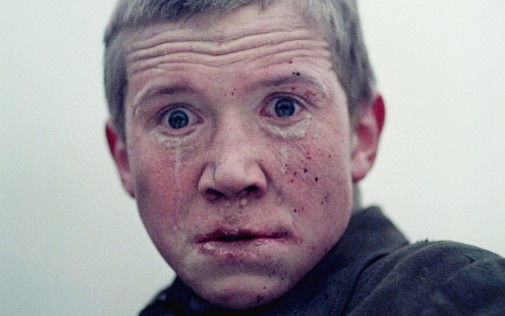
Aleksey Kravchenko, COME AND SEE
If Bale shows us a pampered romantic kid being crushed by the stomp of war, Kravchenko illustrates a boy used to hardship being completely emptied by the ravage of war, its cruelty, and doom. Come and See is closer to an immersive nightmare than to a character study, demanding that its cast be attuned to a heightened register, something beyond naturalism and closer to a demonic form of Expressionistic horror.
Whatever innocence Kravchenko gets to show, it's already been tainted by the time the camera finds him looking for ammunitions with a friend. His Flyora still smiles, but the marks of despair already show, little hairline cracks here and there like the tightness around his eyes, the roughness of his bark. We might not know it, but these hints of suffering are nothing compared to what's to come once the German troops force their way through the Soviet countryside. Deafening in its holler decrying Men's evil, Come and See is a descent into hell and Kravchenko's Flyora is our reluctant guide through its heinous circles.
The other actors in this write-up still get to keep a sliver of their humanity. Kravchenko gets no such gift, having to empty himself completely and utterly. Rumor has it that the experience of shooting Come and See made his hair start prematurely greying, which, while apocryphal, is quite credible. By the end of the picture he certainly doesn't look like a kid anymore, neither does he look like a man, not even an old man. Instead, he's the world scorched by malevolence beyond comprehension, wide-eyed at the things human-kind as done, his face sculpted into the fleshy mute twin of Munch's Scream. Once you've seen this film, you'll never forget Kravchenko's haunted look. It will follow you to the grave.
Come and See is streaming on the Criterion Channel.
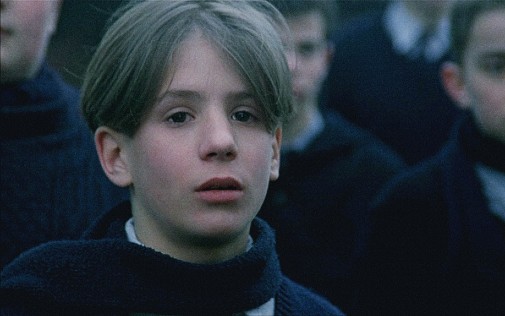
Gaspard Manesse, AU REVOIR LES ENFANTS
The theme of dying childhood during times of catastrophe is transversal to these three dramas. However, each picture deals with it in massively disparate ways. Empire of the Sun weaponizes the naïve perspective of its protagonist. Come and See assaults the viewer with apocalyptic sights of a world unraveling, its inhabitants flayed of their humanity. Louis Malle's Au Revoir Les Enfants takes a more realist approach, observing the process of growing up during World War II, rather than immersing the viewer in it.
At the center of the story, Manesse is Julien, child of a wealthy upper-class French family whose placid life in a boarding school is unnerved by the arrival of two new students. He becomes friends with one of them, Jean, and discovers that the other boy's Jewish and being hidden from the occupying Nazis by the school's priests. Through keeping his companion's secrets, Julien learns about the dark world he lives in, glimpsing outside the ivory tower built from familial heritage and pleasant living.
Malle drew inspiration from his own life, imbuing the project with calcinating power. To bring this story to the screen, he deposited immense trust in his young star, playing an avatar of his director and carrying a film that, for large swaths of runtime, depends on the minuscule changes of expression in the actor's face. It's an incredible performance, full of physical details that speak of a life lived outside the story's limits, vocal choices revealing class, and much more.
Even more impressive, is how internal Manesse's work is. Kravchenko delivered a performance of utmost abandon to extremes of existential anguish and Bale made his character's transformation beautifully transparent. Manesse, on the contrary, let's all of Julien's evolution live in the aborted movements, half-hearted gestures and fleeting nervous looks. When he waves goodbye, an invisible glow of defiance, a promise of affection, and fight. It's a tiny salute, but it carries worlds of meaning. Humanity is summarized in a timid wave.
Au Revoir les Enfants is streaming on HBO Max, Kanopy, and the Criterion Channel.
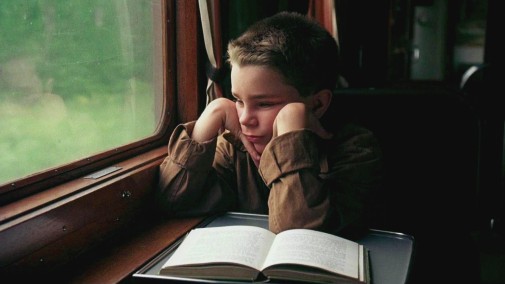 My Life as a Dog
My Life as a Dog
By no means are these the only examples of great child acting from the movies of 1987. They're simply the ones I'd have rewarded with Academy Award nominations.
Other acting feats of this surprisingly strong year for kids onscreen include My Life as a Dog's Anton Glanzellius, whose tic-ridden turn impresses for how it avoids cheap sentiment and portrays grief through underplayed sorrow. My Life as a Dog got nominations for its script and directing and probably got close to a Best Picture nomination. John Boorman's Hope and Glory actually conquered that coveted honor, and it also features a strong child performance. Sebastian Rice-Edwards may not be memorable exactly, but the young boy negotiates the picture's bizarre tonalities with aplomb, often besting his adult colleagues in this nostalgia-infused tale of the British home front during World War II.
No matter their age, these performers have earned our respect and adoration for their work illuminating the child's point of view in times of great misery.
Do you think any of these young thespians deserved Oscar nominations back in 1987? Are there any other child performances that year that you think were special?



Reader Comments (17)
I don't tend to favor children for such nominations - but Bale was remarkable and I would've been happy to see him sub in for a couple of the 1987 nominees.
Wait, Come and See came out in 1985.
I think a Bale performance in an EMPIRE movie would be nominated today. Or would certainly be talked about even more.
But it was later than that in the US, thevoid99. Its US theatrical release was February 1987. Oscar goes by US release date.
All of these would have been great nominees but "Come and See" is a masterpiece. Never seen a film like it.
I really don’t like going by US release dates. Maybe because I’m not American lol I just go by whenever the movie was first released, even if it’s just a festival or whatever. It’s sooo much easier.
Definitely a bumper crop.
In USA, "Come and See" was released in 1987, thevoid99.
ScottC -- Personally, I think he's better than all of the Best Actor nominees from that year. What an extraordinary performance!
thevoid99 -- As others have said, the picture was released in 1987 in the US. It's the same thing with My Life as a Dog. Since I'm framing this matter around the Oscars, I thought it appropriate to consider films that were eligible for the Academy Awards in 1987.
Glenn Dunks -- I'd like to think so too.
Marshako -- It's a haunting film, a cinematic nightmare like nothing I've ever seen. Watching it in the cinema, walls of sound crashing over the spectators and those eyes staring back at you, is a terrifying experience.
Thank you all for the feedback. As always, it's much appreciated.
Bale, Glanzellius, and Manesse all make my ballot. Just flawless performances.
Bale is superb in Empire. Should have definitely been nominated. I haven't seen COME AND SEE but I remember Au Revoir Les Enfants being strong across the board (though i cant comment on the acting since it's been a million years since i've seen it)
There's also Seth Green in Radio Days - yet another WW2 boy from 1987! Such an odd coincidence that the movies had so many that year.
All these kids are excellent in these films.
Both Bale and Manesse would have been on best actor ballot, and I honeslty might have given it to Manesse. I have liked a lot Bale's work but I still think I might qualify this as his best.
I own "Hope & Glory", and I watched it at the beginning of this pandemic in order to stiffen my spine and get some perspective on what we are facing. Surviving World War II took a hell of a lot more grit and courage than wearing a mask when I work and go shopping.
These films aren't just nostalgia, they are history talking directly to us, showing us what humans are capable of doing, and what they are capable of surviving. All of the children's performances were excellent, and I wonder what some child actor will do in 25 years when they try and represent these times.
To everybody who has not seen Come And See: it is available to stream LEGALLY with English subtitles at Mosfilm's YouTube page along with lots of Soviet classics. I think Come and See is the best Soviet movie ever, tied with Larisa Shepitko's The Ascent (Shepitko was Klimov's wife), also available at the same page.
Edward L. -- I forgot that one. Sorry.
Peter -- He's so unbelievably great in the film, I think it's a strong contender for his best performance ever. And that's saying something, considering the career he's had.
LadyEdith -- I don't mean to demean HOPE & GLORY when I call it nostalgia-infused. It's an exercise in nostalgia, a director crystalizing his childhood memories in celluloid, philtering them through the conspicuously romantic perspective of a child. Even the narration that closes it underlines this idea. Nostalgia isn't necessarily bad, though it can be unsound when consumed in excess and no critical eye.
cal roth -- Thanks for that tip. That youtube channel is amazing.
AU REVOIR LES ENFANTS is the only one of these films I've actually seen, so while I can't comment on all of the performances specifically (even though I've heard great things), I just wanted to chime in and say this was an excellent write up. Child actors are all too often ignored when they've given us such incredible work. I'd be interested in reading more of these on different years.